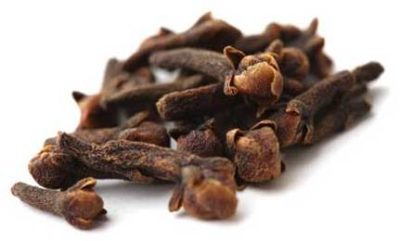
Image source: OrganicFacts.net
When we think of the common spice known as “cloves,” many of us tend to quickly associate it with wonderful food dishes. However, like many other spices and herbs found in our kitchens, there are also several ways to use them as natural remedies as well as in cooking.
Clove oil is extracted from the clove bud through distillation.While eugenol is the main ingredient in clove oil, it is also rich in calcium, iron, sodium, phosphorous, potassium, and Vitamins A and C.
Eugenol is reported to be:
- anti-bacterial
- antiseptic
- anti-viral
- anti-spasmodic
- a natural disinfectant
- broad-spectrum antimicrobial
- anti-parasitic and larvicidal
- fungicide
- a numbing agent
Clove oil has also been purported to increase libido, kill scabies, help expel intestinal worms, relieve flatulence (gas); while some have even claimed that it is effective against tuberculosis bacillus.
(Note: The ONLY part of the clove plant that can be used is the clove bud, all other parts of the clove plant are considered to be too toxic to be used safely. Those with sensitive skin or possible allergies should not use clove oil as it can cause burning and other reactions. Clove oil should not be used by pregnant women.)
Several suggested uses of clove oil mention use of a carrier oil to be included in the recipe for involving a particular use/treatment. Carrier oil is simply coconut oil, almond oil, olive oil or (organic) vegetable oil and is commonly used for the purpose of diluting the clove oil’s strength as clove oil can cause burning to sensitive skin. If you don’t know if you have sensitive skin, I would suggest that you dilute it with one of these carrier oils the first time you use it.
New “Survival Herb Bank” Gives You Access to God’s Amazing Medicine Chest
Here are 10 health benefits of clove oil:
1. Tooth pain. A few years ago when I first started really considering natural remedies, I recall that the aroma of clove oil quickly transported me back to when I was a child in my dentist’s chair. I have since learned that clove oil has in fact been commonly used in dentistry and dental products for years. Because of its antiseptic and numbing properties, many dentists have used it to topically numb a patient’s gums before injecting a secondary numbing agent and beginning dental work. The germicidal properties of clove oil make it a desirable additive in many dental products. Some examples of this are mouthwash, toothpaste and topical dental pain relief for mouth ulcers, toothache, sore gums and more.
Keep in mind that a very little goes a looong way. I keep a small bottle of clove oil in my medicine cabinet just in case I suddenly have a toothache or other mouth pain. I have been very grateful at times for how quickly it worked to numb my tooth pain until I was able to see my dentist.
I just tore a small corner of paper towel (about an inch square — you might want to use a little larger piece depending on the area you’re trying to treat) and then I put a very small amount of the clove oil on the paper towel. Since it was an upper tooth that gave me the problem, I placed the treated piece of paper towel between my gum and cheek above the tooth that was hurting. Instant relief! The only side effect I experienced is that it made me drool a little as it seemed to increase my saliva production. (Now the Mom in me just has to say this: Never sleep with anything in your mouth as you might choke!” There, I feel better now, thank you.)
2. Breath freshener. A touch of clove oil can be used as a breath freshener. I do recommend that you dilute it a bit with some carrier oil if you are sensitive and concerned about burning.

Image source: Care2.com
3. Wart removal. When treating warts, apply the oil directly onto the wart without diluting it. Cover the treated wart with a Band-Aid. Do this once a day until the wart shrinks up and drops off. It has been suggested that once the wart is gone, massaging wheat germ oil where the wart once was can help if there is any pain and may help if there are any signs of potential scarring.
4. Insect repellant/treat insect bites. What Benjamin Franklin once said — “An ounce of prevention is worth a pound of cure” — definitely holds true when it comes to insect bites (as it does with all aspects of our health). Clove oil can work as an effective insect repellent. Out of all the potential plant oils for keeping insects at bay, clove oil has been found to be the only one that can give 2-4 hours of protection against several mosquito types. Try it anywhere from 10-50 percent concentration. After being bitten, clove oil’s eugenol can act as an antiseptic and a numbing agent to stop pain and/or itching.
5. Skin care. Clove oil can be used to treat acne. It is reported to be very effective in clearing cystic acne and to kill the infections which in turn result in the reduction of swelling in the affected area(s). Place 2-3 drops of pure clove oil in your skin lotion or oil (I recommend you make your skin lotion from scratch with all-natural ingredients) and use regularly on problem areas along with the rest of your skin. Again, be careful how much you use while keeping in mind its potential to burn sensitive skin.
6. Stress and body aches. Indians used special clove oil massages to relieve stress and pain. Its aphrodisiac qualities act as a stress buster. It is reported that it can also reduce mental exhaustion, fatigue, anxiety and tension as it has a relaxing effect on the mind.
7. Headaches. Combine 2 teaspoons of coconut or almond oil with 1 teaspoon of sea salt and 2-3 drops of clove oil. Use mixture to gently massage your forehead. You will notice a cooling sensation and you should experience relief.
8. Respiratory problems. Some have reported that chewing a clove bud can cure a sore throat. This benefit is because clove oil has a cooling and anti-inflammatory effect on the nasal cavity and the throat. It helps in clearing the nasal passages and thus is useful for respiratory problems like cough, cold, sinusitis and asthma. (Note: You should not try natural remedies without consulting your physician if you have any reservations about possible allergies or other health concerns.)
9. Earaches. Here’s one home remedy recipe: 2 teaspoons of sesame oil added to 3-4 drops of pure clove oil. Warm it, but be careful not to warm it too much. Next, slowly apply this mixture inside your ear.
10. Indigestion. Clove spice is an important ingredient in many Indian dishes. Clove aids in healthy digestion. It also provides relief from problems related to digestion. It can help with nausea because of its anti-spasmodic properties.
What other uses have you found for clove oil? Tell us in the comments section below.
Sign up for Off The Grid News’ weekly email and stay informed about the issues important to you
 Off The Grid News Better Ideas For Off The Grid Living
Off The Grid News Better Ideas For Off The Grid Living




